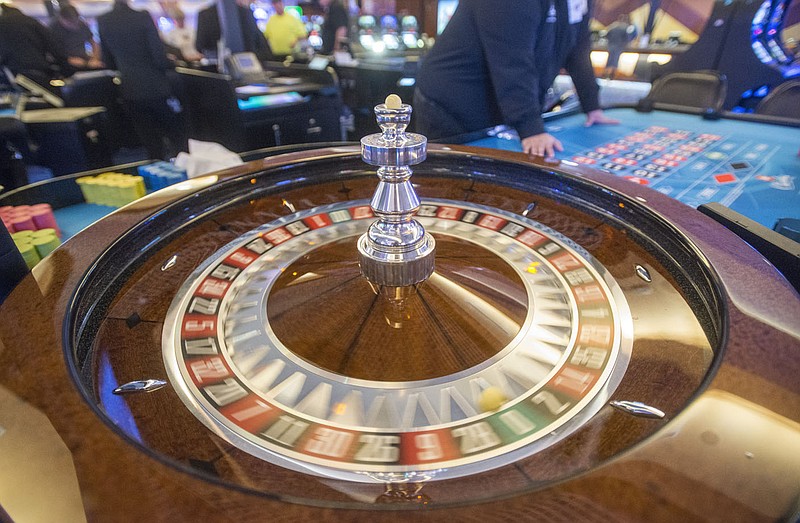A Pulaski County circuit judge will not provide remote video access to -- and has barred the media and the public from physically attending -- a Friday court hearing concerning the Pope County casino license.
Attempts over three days by the Arkansas Democrat-Gazette to reach Circuit Judge Tim Fox have been unsuccessful.
His trial court administrator, Christie Greer, called Wednesday afternoon after the Democrat-Gazette submitted a "Request to Attend" letter. Greer said Fox is barring access because of a March 16, 2020, executive order from Pulaski County Judge Barry Hyde, the county executive, that restricts public access to certain county buildings because of the coronavirus pandemic.
Greer said electronic remote video access also will not be provided. When asked why the court session would not be livestreamed, she repeated: "The courtroom is closed to the general public, per the executive order from the county judge."
Questions that followed were answered with the same line from Greer.
A message left for Pulaski County Circuit Judge Leon Johnson, the administrative judge for the 6th Judicial Circuit, was not returned as of late Wednesday.
Cases heard in the Pulaski County Courthouse since the pandemic began are streamed over video and are accessible using a link and code provided upon request by a member of the presiding judge's staff.
Hyde's executive order recently was extended to June 6. The order restricts public access to the county administration building, courthouse, regional building, the prosecutor's office and the district court/juvenile justice complex.
When contacted, Hyde said his order was never meant to close court proceedings; only to reduce access to limit the spread of the virus. There are cameras in every courtroom to enable public access, Hyde said.
"If there's a problem with the equipment, then certainly we're going to get it taken care of quickly," Hyde said. "We want to keep our employees and the public safe, but we want to be as little hindrance to the judicial system as possible."
Fox allowed the Democrat-Gazette to physically attend a hearing in the same case on July 2, shortly after the pandemic hit the state. A mask was required and the seating was spaced for appropriate social distancing.
The public has a right of access to the courtroom under the U.S. Constitution, said Christoph Keller, a lawyer at Quattlebaum, Grooms & Tull and counsel for the Arkansas Press Association.
"Denying access to view even a video stream of the hearing on Friday, when we are in month 14 of the pandemic, violates that right, in my opinion," Keller said. "Other courts in Little Rock have taken steps to ensure public access to the courtroom during the pandemic."
District Judge Vic Fleming, for example, ordered that anyone claiming a right to be present at a public hearing in traffic court will be accommodated, Keller said.
"It's mind-boggling that the public can exercise their right to observe a hearing on a speeding ticket while being denied the right to observe a proceeding that could determine who gets to operate one of four casinos in Arkansas," Keller added.
Katherine Shurlds, a now-retired journalism professor with the University of Arkansas, outlined tips for journalists facing closed courtrooms. The instructions are in the Arkansas Freedom of Information Act handbook -- which is distributed by the state attorney general's office -- and state that even though courts are not covered by the Freedom of Information Act, "open courts are still preferred and are usually open."
The media and members of the public can challenge a closed courtroom by registering an objection.
"Standards set forth in recent state and federal court decisions gives us the opportunity for a hearing before the courtroom is closed," Shurlds wrote.
The Democrat-Gazette submitted a letter to Fox on Wednesday evening objecting to being barred from Friday's court hearing.
In an April 1 letter from Fox to the attorneys in the case, Fox cites Hyde's pandemic order and said that only one attorney per client will be permitted to physically attend the hearing.
Friday's hearing in the case is taking place after the Arkansas Supreme Court overturned a previous ruling by Fox in which he denied Cherokee Nation Businesses' request to intervene in the case.
Cherokee Nation Businesses is vying with Gulfside Casino Partnership for the Pope County casino license.
Fox is set to consider whether letters from previous local officials endorsing Gulfside meet the constitutional requirements of Amendment 100 that a casino applicant must have such backing.
The 2018 constitutional amendment legalized casino gambling in the state, including placing a new casino in Pope County.
The case was filed by Gulfside in 2019 after its application was denied by the state Racing Commission because its letter of support was signed by then-County Judge Jim Ed Gibson, just days before his term expired on Dec. 31, 2018.
Gulfside was eventually awarded the Pope County casino license by the Racing Commission after Fox ruled unconstitutional a state law and a Racing Commission rule on the endorsement letters.
Arkansas Code Annotated § 23-117-101 and Casino Gaming Rule 2.13.5(b) state that a letter of support from the county judge or a resolution of support from the quorum court is required and must be signed and dated by the county judge or quorum court "holding office at the time of the submission of an application" for a casino license.
Amendment 100 says only that an endorsement is required.
Fox said in his ruling that the state law and the gaming rule added extra requirements that were not allowed to be added to a constitutional amendment.
Gulfside -- which operates a casino in Gulfport, Miss. -- proposed a $254 million casino and resort with 1,900 slot machines, 90 table games and 500 hotel rooms near Russellville north of Interstate 40, with additional investment and rooms within five years.
The Cherokees are proposing a $225 million casino and resort with 1,100 slot machines, 32 table games and 200 hotel rooms near Russellville off Hob Nob Road, also north of I-40.
